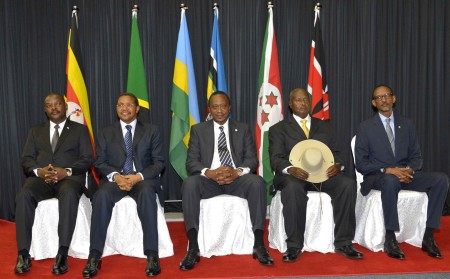
The presidents of five East African states met this week in northern Tanzania, to discuss, among other things, the launching of the new electronic East African Passport and the possibility of adding new members, including South Sudan into the Arusha-based, community.
Kenya, Rwanda, Uganda, Burundi and Tanzania will introduce the new digitalised and machine-readable East African Community (EAC) e-passport to replace the old EAC travel document, which was restricted to just the five member states. The proposed e-passport is to be as international as the current Tanzanian booklet passport, which means it will be accepted all over the globe.
The new EAC e-passport is to be introduced in January 2017, with each member nation being given until December 2018, to phase out their individual national passports.
This latest development is further demonstration of progress for the ongoing integration agenda. The EAC is made up of six member countries; the aforementioned five, plus South Sudan, which officially joined the bloc this week.
“The Heads of State further directed partner states to undertake awareness creation programmes and other continuous outreach programmes on the new international e-passport,” reads part of the Communiqué that was issued after the Summit.
The new document is said to be highly secure and difficult to duplicate when compared to the existing passports. Electronic passports provide travellers with benefits, such as the ability to use automated border clearance or “E-gates”, the automated issuing of boarding passes and faster travel arrangements with airlines.
Commenting on the development, John Mirenge, the CEO of RwandAir, said: “That is a very welcome development since it will further ease intra EAC travels. From our perspectives, that is great for sub regional air travel business.”
Apart from facilitating fast clearance of travellers at immigration checks, an e-passport’s database is enhanced with the Automated Fingerprint Verification System (AFIS) that guards against the issuing of multiple passports to the same person and enhances imposter detection. An e-Passport is also known as a biometric passport.
Biometrics are the unique and measurable physical characteristics of an individual that include face recognition, fingerprints, and iris scans.
An electronic passport contains an electronic chip encoded with the same personal information found on page 2 of the document.
Presidents Paul Kagame of Rwanda, John Magufuli of Tanzania, Yoweri Museveni of Uganda and Uhuru Kenyatta of Kenya attended the Summit while Burundi was represented by Joseph Butore, second Vice-President. South Sudan which has become the EAC’s sixth member, was represented by Vice President, James Wani Igga.
The 17th Ordinary East African Community Heads of State Summit also deliberated on a report by the EAC Council on the verification exercise for the admission of the Republic of Somalia into the bloc.
Other items on the agenda included the Council’s reports on the mode, structure and action plan of the EAC Political Federation; implementation of the framework for harmonised EAC roaming charges and modalities for the promotion of motor vehicle assembly in the region.
On Thursday, President Magufuli and his Kenyan counterpart, President Uhuru Kenyatta, will lay a foundation stone for construction of the Arusha-Holili-Taveta-Voi road linking Tanzania and Kenya. The road is under EAC development plans, being implemented by EAC member states.









